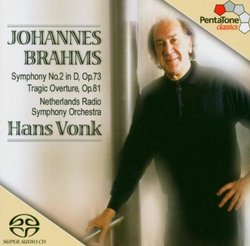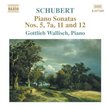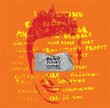| All Artists: Hans Vonk, Netherlands Radio Symphony Orchestra Title: Brahms Symphony No. 2 in D / Tragic Overture Op. 81 (Multichannel Hybrid SACD) Members Wishing: 0 Total Copies: 0 Label: Pentatone Release Date: 4/27/2004 Album Type: Hybrid SACD - DSD Genre: Classical Style: Symphonies Number of Discs: 1 SwapaCD Credits: 1 UPC: 827949004261 |
Search - Hans Vonk, Netherlands Radio Symphony Orchestra :: Brahms Symphony No. 2 in D / Tragic Overture Op. 81 (Multichannel Hybrid SACD)
 | Hans Vonk, Netherlands Radio Symphony Orchestra Brahms Symphony No. 2 in D / Tragic Overture Op. 81 (Multichannel Hybrid SACD) Genre: Classical |
Larger Image |
CD DetailsSimilar CDs |
CD ReviewsA fine, nuanced performance Brian W. Bough | Albuquerque, New Mexico | 07/28/2004 (4 out of 5 stars) "This disc is notable for two reasons. It is the first multi-channel SACD recording of a Johannes Brahms symphony. It is also a minor triumph of Maestro Hans Vonk over ALS (Lou Gherig's disease). With regards to the latter point, I purchased this disc out of devotion to a conductor who brought me many fine performances during his tenure with the Saint Louis Symphony Orchestra. Over a period of about seven years, it was heartbreaking to see Maestro Vonk go from confidently striding onto the stage for some of the most beautiful concerts I have ever heard to seeing him at his last concert, podium removed, perched on a stool, barely able to make it on and off stage under his own power.
This story is not one of sadness, but one of devotion. Clearly, the Netherlands RSO is devoted to Maestro Vonk. And, it is also clear that the Netherlands RSO and Maestro Vonk are dedicated to the music of Johannes Brahms. Other reviews for this disc that I saw when considering my purchase rightly describe the opening movement as slow, certainly slower than what we normally hear. However, this is dismissive of what is contained on the disc. Yes, it is slow, but what I found very compelling about the speed is that the piece moves from a slow, probing examination of the early material at the beginning to a more confident (albeit relaxed) stride midway through, in the recapitulation of the opening bars (yes, all repeats are observed). But, while "slow" is the word of the moment, of course, the tempo picks up considerably to what we might normally expect. The result is a contentment with the exposition that one might not otherwise expect until the resolution and denouement. There is a satisfaction that I feel with the end of the first movement that carries over into the searching nature of the adagio--the adagio feels more purposeful than in other recordings (Karajan and Szell spring immediately to mind, but also in more recent--and fine--attempts by Eschenbach and Jansons). Where I think the disc has its heart is in the last two movements. At the risk of overusing the word 'natural,' these movements naturally flow from their antecedents and fit together in precisely the way I believe that Brahms would want. As with the rest of the work, the orchestral playing is appropriately light when necessary and easily the match needed for the more serious themes. In all, it is a very rousing perfomance of what may be the most beautiful work of high romanticism. That said, there are some reservations I hold toward this disc. The sound is immaculately captured. The disc is well-engineered and will delight anyone whose sound investments include an SACD player and wonderful speakers. But the recording studio itself detracts from the overall performance of the work. What is immediately audible is the finely nuanced detail and precision of the ensemble: it's stellar. This disc should be an example to recording engineers everywhere about what is right in state-of-the-art recording. What is not audible is an overall sense of unity in orchestral sound. Something magical happens in concert halls: the added space blends the different lines into a seamless fabric. The difference? It's roughly akin to sitting in with the orchestra rather than sitting in the audience. You can hear all the parts, but you have a difficult time understanding the entirety of the piece. Admittedly, I like this disc enough that I don't believe it detracts from the overall value I have in owning it. Others may insist I am just nitpicking. One thing that is particularly good to know is that Maestro Vonk prefers his orchestras to play with reduced vibrato (read: increased tonal accuracy). This sound scheme has not been served well by standard compact disc recording techniques. However, this recording sounds absolutely terrific. Along the lines of the performance, the Netherlands RSO is a wonderful ensemble. The recording technique exposes the depth of their sections and they respond wonderfully with solid playing and expressive nuance. However, in up-tempo sections, the attacks and releases are not nearly as uniform as they are in the slower passages. This is especially evident in the Tragic Overture, which may have suffered in rehearsal time as an appropriate filler was selected for the disc. All in all, I recommend this disc and I am very happy with my purchase. Fans of Hans Vonk will not be disappointed and I believe newcomers will be treated to a fine performance captured beautifully. And, if you like this disc, you may wish to try Maestro Vonk's interpretation of Anton Bruckner's seventh symphony, available on the Arch Media label. *** Epilogue: Maestro Vonk, sadly, died on August 23, 2004. While I am sad that his musical mind will no longer grace our concert halls, I relish the fact that he has left a handsome recording legacy behind and, more importantly, now has respite from the debilitating illness that persistently hampered him. RIP." |





